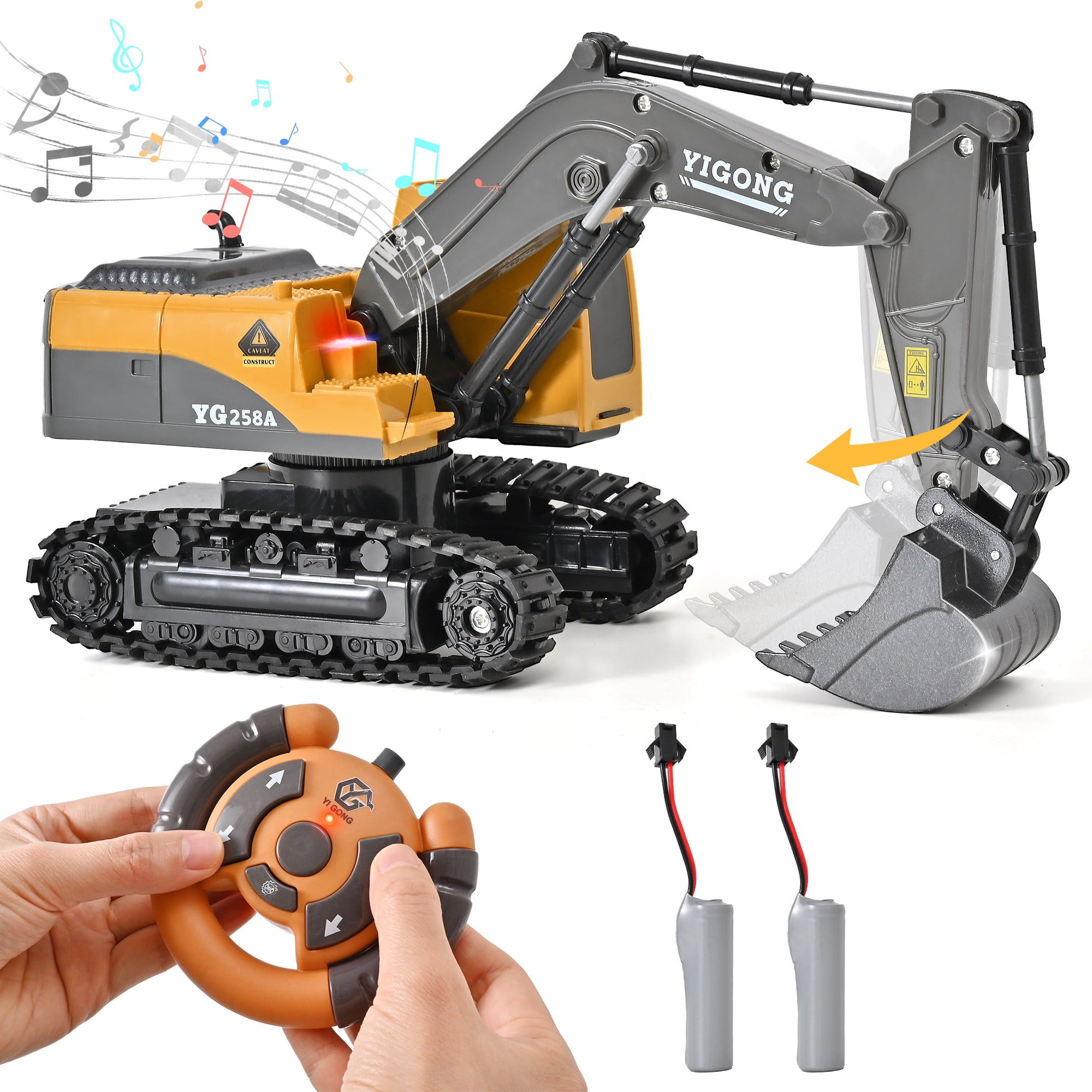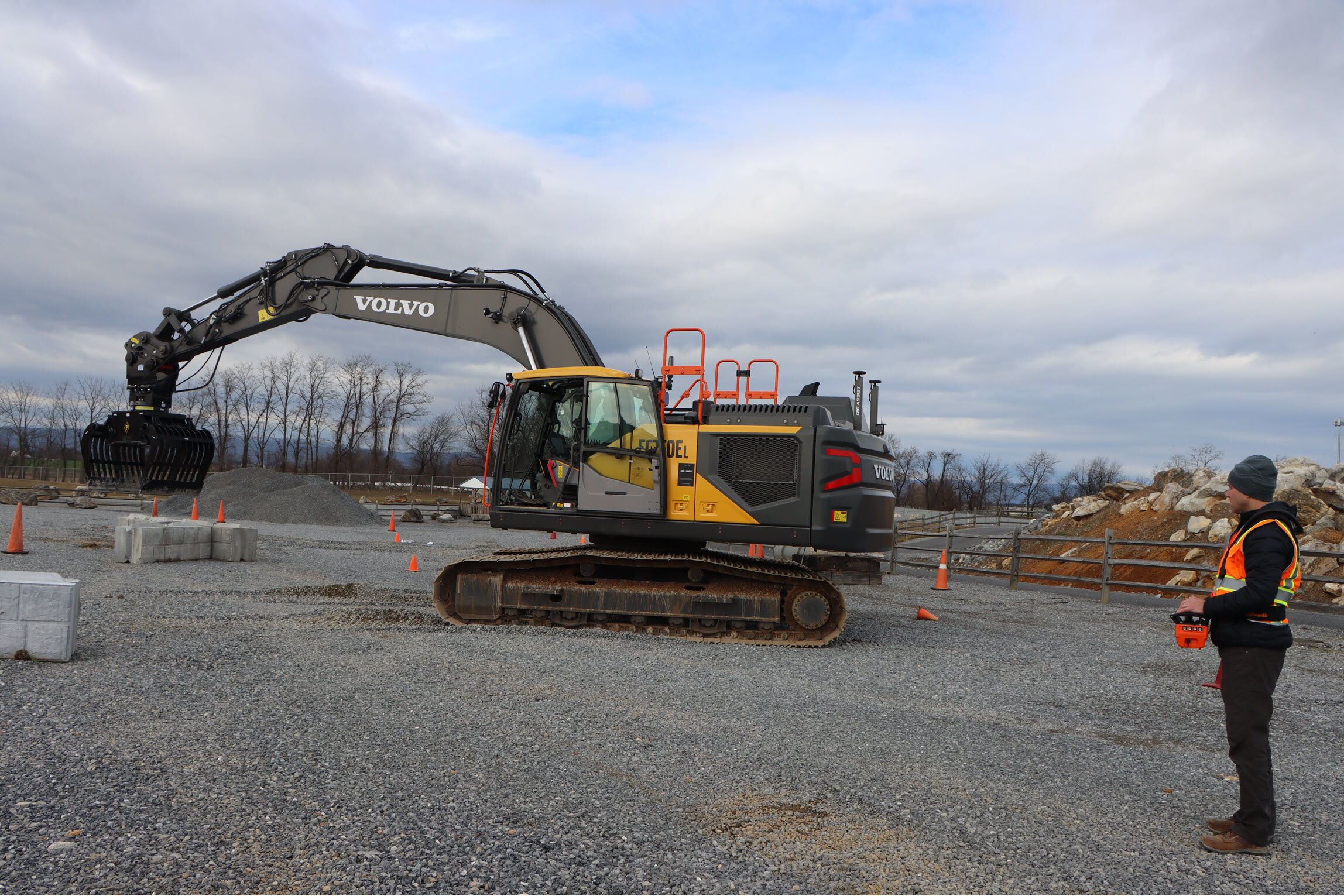Discover the Relevance of Excavator in Modern Building Projects
Excavators are necessary tools in modern construction projects. Their convenience allows them to execute a variety of tasks, from digging and grading to demolition and website prep work. Advanced features, such as hydraulic attachments and GPS, enhance their capabilities and effectiveness on task sites. As the sector advances, the significance of excavators expands much more. Recognizing their duty can expose understandings right into the future of building techniques. What exists in advance for these makers?
The Convenience of Excavators in Various Projects
Although excavators are usually connected with large building jobs, their versatility enables them to be used in a large range of applications, from household landscape design to utility maintenance. In city settings, excavators can browse tight areas to dig structures for homes or mount drainage systems. Their ability to execute fragile tasks makes them perfect for landscape design tasks, where they can excavate for ponds or plant trees. On top of that, excavators play an important role in utility maintenance, effectively excavating trenches for pipes or wires without interfering with bordering areas. In farming applications, they aid in land cleaning and soil preparation. Furthermore, their flexibility enables them to be furnished with numerous accessories, boosting their functionality across various tasks. This diverse nature of excavators not just improves numerous construction procedures however also shows their indispensable function in modern-day facilities advancement and upkeep.
Secret Attributes and Kinds of Excavators
The discussion on crucial attributes and types of excavators highlights the vital qualities that make these equipments invaluable in building. Various excavator kinds, each made for specific tasks, demonstrate their convenience and performance throughout various applications. rc excavator. Understanding these categories and attributes is vital for optimizing their use in modern building and construction tasks
Excavator Types Review
Excavators play a pivotal function in contemporary building, using convenience and performance across different jobs. These heavy machinery units come in a number of types, each tailored for certain applications. One of the most usual kinds include spider excavators, known for their security on irregular terrain, and rolled excavators, which offer higher flexibility on paved surfaces. Tiny excavators are favored for limited rooms and small-scale projects, while long-reach excavators are made for deep excavating. In addition, there are specialized excavators, such as hydraulic excavators, which enhance power and accuracy. Each kind features special abilities, making them vital for tasks ranging from digging and grading to demolition and material handling. Comprehending these variants allows building and construction specialists to select the ideal excavator for their job requires.
Key Features Explained
Recognizing the essential features of excavators enhances their reliable application in building and construction jobs. Excavators are identified by their effective hydraulic systems, which supply the needed pressure for excavating, training, and relocating products. Their expressed arms permit a variety of motion, helping with specific procedures in restricted spaces. Additionally, the variety of add-ons, such as containers, grapples, and augers, broadens their adaptability to satisfy different task needs. The dimension and weight of excavators also add to their security and maneuverability on different terrains. Advancements in modern technology have actually led to the assimilation of GPS and automation, improving accuracy and performance in excavation jobs. These features jointly position excavators as important tools in modern-day construction.
Applications in Building and construction
Changing building websites, excavators play an essential duty throughout numerous applications, ranging from property building projects to massive framework developments. These functional machines are furnished for jobs such as excavating structures, trenching for utilities, and website grading. Various types of excavators, consisting of spider, rolled, and mini excavators, provide certain advantages customized to the job demands. Spider excavators excel in rough surfaces, while rolled excavators use wheelchair on paved surface areas. Mini excavators are ideal for confined rooms, making them prominent in urban settings. The effectiveness and power of excavators considerably quicken building processes, ensuring prompt job completion. Their versatility further enhances their importance, enabling construction teams to tackle a diverse selection of challenges efficiently.
Enhancing Effectiveness and Performance on Job Sites
Optimizing efficiency and performance on task websites is an important objective in modern construction. Excavators play a critical function in attaining this objective by improving various jobs. Their capability to do numerous functions-- such as lifting, excavating, and grading-- lowers the demand for extra tools, thus saving time and resources.Moreover, excavators enhance operations by allowing for faster completion of tasks. With innovative features like hydraulic add-ons and general practitioners innovation, they can implement precise procedures that lessen errors and revamp. This precision not only boosts the top quality of job however additionally optimizes product use, adding to set you back savings.The adaptability of excavators enables them to adapt to different site problems, making certain that tasks advance efficiently regardless of challenges. By integrating excavators right into construction procedures, teams can substantially increase their total efficiency, leading to timely job conclusion and enhanced success.
Security Benefits of Using Excavators
Excavators substantially boost safety and security on construction sites via improved operator visibility and lowered manual labor threats. By providing operators with a clear view of their environments, excavators help to avoid injuries and accidents. Additionally, the machinery decreases the need for workers to take part in dangerous manual jobs, further advertising a more secure work setting.
Enhanced Operator Presence
Construction sites can be disorderly and loaded with possible threats, boosted operator presence plays an essential duty in making sure safety when using excavators. Modern excavators are made with huge, unhampered windows and tactically positioned mirrors, permitting drivers to maintain a clear view of their surroundings (rc excavator). This boosted presence is essential for spotting pedestrians, various other equipment, and numerous challenges, significantly decreasing the threat of accidents. Furthermore, several excavators integrate sophisticated technology, such as sensors and cams, to supply drivers with extra perspectives, even more improving awareness. The capacity to see even more clearly not only help in effective operation however likewise cultivates a much safer workplace, making it easier for operators to navigate complex building sites without compromising safety criteria
Decreased Manual Work Risks
When manual work is minimized with making use of excavators, many safety advantages emerge, substantially improving the health of building and construction workers. Excavators reduce the physical strain linked with learn this here now hefty training and repetitive tasks, efficiently reducing the risk of bone and joint injuries. By automating processes such as excavating, grading, and moving materials, they allow workers to maintain a much safer range from possible hazards. In addition, excavators are outfitted with advanced security features, such as rollover security systems and improved driver comfort designs, which even more secure workers on site. The outcome is a substantial reduction in office mishaps and injuries, leading to raised performance and morale among building groups. Ultimately, the adoption of excavators contributes to a much safer and a lot more efficient construction atmosphere.
Excavators in Earthmoving and Site Preparation
In modern building, a substantial section of earthmoving and site prep work tasks counts on the effectiveness and convenience of excavators. These makers are created to handle different soil kinds and terrain, making them important for rating, excavating, and trenching activities. Their hydraulic arms can be geared up with different attachments, such as containers and augers, allowing operators to customize their method based on certain project requirements.Excavators excel at moving large quantities of earth swiftly and efficiently, which increases the total building and construction timeline. They can browse tight areas and challenging websites where conventional tools may have a hard time, boosting efficiency. Furthermore, the accuracy of excavators warranties that site preparation follows strict specifications, decreasing the risk of errors that could result in costly rework.
The Role of Excavators in Demolition Tasks
Excavators try these out play a vital role in demolition tasks, as they have the power and agility required to dismantle structures effectively. Geared up with different add-ons such as hydraulic breakers, shears, and grapples, these equipments can adapt to various demolition needs, whether for small structures or big industrial sites. Their versatility makes it possible for operators to take on intricate jobs while keeping safety and security and precision.In addition to their demolition capabilities, excavators promote particles removal, making certain that work websites continue to be organized and safe. By breaking down structures right into convenient pieces, they enable for streamlined clearing and recycling of products, lining up with contemporary sustainability efforts.Moreover, excavators can access tight areas and browse irregular surface, making them vital in city demolition projects. Overall, their durable design and multifunctionality make excavators a critical asset in the demolition phase of building and construction, adding significantly to job timelines and performance.


Future Fads in Excavator Technology and Use
As the building market develops, advancements in excavator modern technology are poised to change their usage and performance significantly. One significant trend is the integration of automation and artificial intelligence, allowing excavators to operate with marginal human intervention. This change will improve precision in tasks such as grading and trenching, decreasing human error and enhancing productivity.Additionally, the surge of electrical and hybrid excavators is shaping a much more sustainable construction environment, reducing carbon emissions and fuel costs. Boosted telematics systems are additionally emerging, allowing real-time surveillance of machine efficiency and upkeep needs, which can cause much better functional effectiveness and longer devices lifespan.Moreover, improvements in accessory innovation are broadening the versatility of excavators, allowing them to execute a broader series of jobs. The combination of these fads shows a future where excavators are smarter, greener, and a lot more versatile, inevitably improving building and construction job dynamics.
Often Asked Inquiries
Just How Do Excavators Compare to Other Building Equipment?
Excavators, identified by their adaptability and power, master Get the facts digging and earthmoving contrasted to various other machinery. Their ability to execute various tasks, including lifting and demolition, makes them indispensable in building and construction tasks, improving general efficiency.

What Is the Ordinary Lifespan of an Excavator?
The typical lifespan of an excavator generally varies from 7,000 to 10,000 operating hours, depending on upkeep, usage problems, and model. Correct care can extend this life expectancy, guaranteeing peak performance throughout its operational years.
Just How Are Excavators Maintained for Optimal Performance?
Excavators require regular maintenance for peak performance, consisting of routine examinations, fluid checks, filter substitutes, and prompt repair services. Implementing a preventive upkeep routine aids prolong their life expectancy and assurances effective procedure in various building settings.
What Are the Costs Linked With Buying an excavator vs. renting?
The prices related to acquiring an excavator versus renting out vary substantially. Renting out deals lower upfront expenses but can accumulate gradually, while buying needs a considerable preliminary investment, however supplies long-lasting financial savings and asset ownership advantages.
What Training Is Called For to Run an Excavator?
Operating an excavator needs specialized training, typically including safety protocols, device operation strategies, and environmental awareness. Qualification programs often mandate useful experience, enabling operators to take care of different tasks efficiently while making certain conformity with sector guidelines. The most common types include crawler excavators, understood for their stability on uneven terrain, and rolled excavators, which offer greater movement on paved surfaces. Mini excavators are preferred for tight areas and small jobs, while long-reach excavators are created for deep excavating. In addition, there are specific excavators, such as hydraulic excavators, which boost power and precision. Various kinds of excavators, consisting of spider, wheeled, and mini excavators, supply specific advantages tailored to the task requirements. Crawler excavators stand out in rough terrains, while wheeled excavators use flexibility on smooth surfaces.